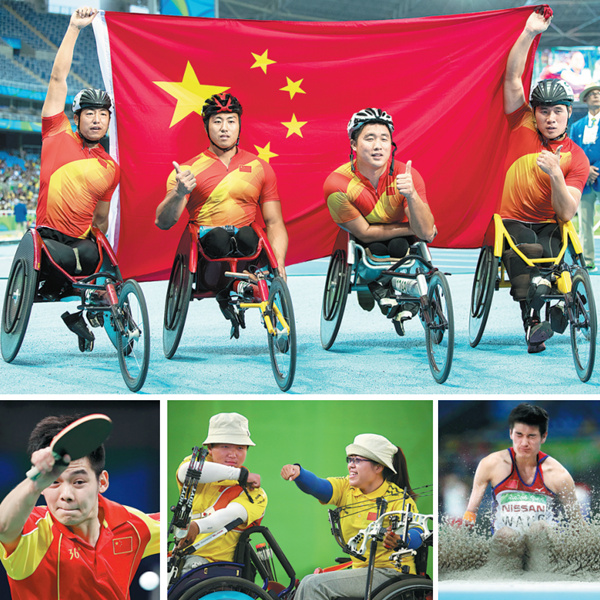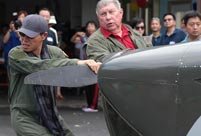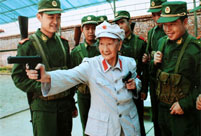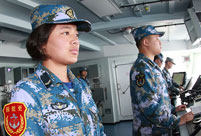

Paralympians win more than 100 gold medals, far outpacing other countries

Clockwise from top: Men’s relay team wins gold; silver medalist Wang Hao in the men's long jump; archers Ai Xinliang (left) and Zhou Jiamin at a mixed team final; Zhao Shuai competes in a table tennis final. PHOTOS BY AFP AND REUTERS
Chinese athletes continued their dominance at the 2016 Paralympic Games, which draws to a close on Sunday in Rio de Janeiro.
By the end of competition on Saturday in Brazil, China had won a total of 237 medals, including 105 gold, compared with the second-place United Kingdom's total of 147 medals, including 64 gold.
While they have attracted less attention than the stars of the 2016 Summer Oympics last month, such as gold-winning swimmer Sun Yang or the exuberant bronze medal swimmer Fu Yuanhui, they have done their more famous fellow athletes one better.
In fact, the 11-day competition was the fourth consecutive time China has dominated the medal standings at Summer Paralympics since Athens in 2004.
Female veteran athlete Yao Juan broke her own world record to win gold in a discus category for those with muscle impairment after throwing 44.53 meters in her first final attempt. It was her fourth gold medal spread over four Paralympic Games, including shot put gold at London 2012 and gold in javelin at Beijing 2008 and Sydney 2000.
"If I didn't pick up para-sport training in 1998, I wouldn't have been able to carry myself through life's adversities, not to mention traveling around the world and winning glory for my country," said Yao, who lost muscle power in her left leg due to polio.
Chinese swimmer Xu Qing, who lost both arms in a car accident at age 6, won three gold medals in Rio, touching his head to the pool's wall before all other swimmers in the 50-meter butterfly, 50-meter freestyle and mixed 4-by-50-meter freestyle in his category. He has now earned 10 career gold medals.
At Rio's Olympics Aquatics Center, the 24-year-old Xu earned loud cheers from the crowd, which sounded just as overwhelming as the accolades that his idol, American swimming star Michael Phelps, received after completing a record-breaking career 23 Olympic gold medals one month ago.
Each update on the Chinese athletes' victories and their action photos posted on weibo Chinese social networks attracted thousands of likes and positive comments.
"The media owes them headlines as they performed so well but with much less coverage than during the Olympics," a netizen named Shixiaokaiya said.
Some 4,350 athletes from 160 countries and regions competed at the Paralympics on the court, track and in the pool.
The 308 Chinese athletes who competed in 17 out of 22 sports not only inspired the world with their performances and personal journeys to a world competition, but their presence also spoke loudly of their country's commitment to promoting equality for the disabled in sports.
Zhang Haidi, head of the Chinese delegation, hailed the Chinese athletes' outstanding performances as a special inspiration for the vast number of others challenged by disabilities.
"A lot of disabled people struggle in life because of physical impairment and poverty, and our athletes competing in Rio had hope that everything is possible if their hearts said no to limitations," Zhang was quoted as saying by China National Radio on Saturday.
Fifty-seven Chinese athletes competing in Rio are categorized as severely disabled, but that didn't stop them. On the track, Chinese athletes distinguished themselves despite visual and limb disabilities.
The athletes' will to succeed at Paralympic Games also has spurred improvements in facilities, guidance and accessibility at the regional level in China, making it easier for many disabled people to participate in sports for fun, overall health and rehabilitation, said Hua Qingpang, former official with China's National Paralympic Committee.
"The increase in coaches, physical trainers and support staff dedicated to these athletes at the grassroots level has helped more disabled people with athletic talent and passion train more scientifically. The medical support, rehab therapy and mental guidance as well as management for disabled athletes have been improved as well," he told Xinhua News Agency.
According to the Sports Department of China Disabled Persons' Federation, the country had trained more than 42,100 fitness instructors for the disabled and had built 225 provincial and 34 national specialized sports training centers by 2016. The number of registered athletes with disabilities has reached 10,000, and around 3.35 million out of the country's 85 million disabled people have participated in sports-related exercise at least once over the past five years.
The State Council has given its approval for the 10th National Games of Disabled Persons to be held right after the 13th National Games in Tianjin next year, marking the first time the two games will be held consecutively at one place, to highlight equality in sports participation.
"The successful Rio Paralympics campaign has proved China's efforts in the cause of improving sports participation and the welfare of disabled persons. We should learn from the practices of all participating countries, including the host, Brazil, and better promote the work of health and happiness of the disabled in China," said Zhang, head of Chinese delegation.
 Home-made plane completes test flight in Chicago
Home-made plane completes test flight in Chicago The untold stories of women in the Long March
The untold stories of women in the Long March Female soldiers on Frigate Jingzhou
Female soldiers on Frigate Jingzhou Top 10 most beautiful Chinese athletes in Rio
Top 10 most beautiful Chinese athletes in Rio Shenzhen seizes 549 tons of illegally smuggled clothing
Shenzhen seizes 549 tons of illegally smuggled clothing Chinese actor Wang Baoqiang divorces wife, fires manager
Chinese actor Wang Baoqiang divorces wife, fires manager Hangzhou: host city of G20 Summit
Hangzhou: host city of G20 Summit New hovercrafts debut in landing exercise
New hovercrafts debut in landing exercise Woman sets Guinness World Record with 17-month-long pregnancy
Woman sets Guinness World Record with 17-month-long pregnancy Top 10 livable Chinese cities
Top 10 livable Chinese cities Top 20 hottest women in the world in 2014
Top 20 hottest women in the world in 2014 Top 10 hardest languages to learn
Top 10 hardest languages to learn China’s Top 10 Unique Bridges, Highways and Roads
China’s Top 10 Unique Bridges, Highways and Roads China must counter Japan in S.China Sea
China must counter Japan in S.China Sea Naval drill not aimed at third party: official
Naval drill not aimed at third party: official Child-carrying porters make a hard-earned living in Hubei’s Enshi Grand Canyon Scenic Spot
Child-carrying porters make a hard-earned living in Hubei’s Enshi Grand Canyon Scenic Spot 62-year-old still hopes to find legendary wildman
62-year-old still hopes to find legendary wildmanDay|Week